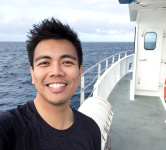

Ahmad Rafiuddin Rashid
raf.rashid@my.jcu.edu.au
Recipient of an AIMS@JCU Scholarship
PhD
College of Science and Engineering

Ahmad Rafiuddin Rashid
raf.rashid@my.jcu.edu.au
PhD
College of Science and Engineering
Investigating hyperspectral imaging for monitoring health of coral recruits to improve recruit resilience
Ahmad Rafiuddin ("Raf") received his BSc degree in Life Sciences from the National University of Singapore, specialising in environmental biology. He then gained experience in coral reef restoration techniques, while working as a research assistant at the Reef Ecology Lab at the Tropical Marine Science Institute (Singapore). In 2017, Raf pursued a MSc degree in Marine Biology at Universität Bremen (Germany). For his Master's research thesis, Raf joined the Microsensor Group at the Max Planck Institute for Marine Microbiology (Germany), where he was involved in the development and validation of a new proximal sensing method of surveying coral reefs, using underwater hyperspectral imagery and machine learning to generate maps of high spatial and taxonomic resolution.
Investigating hyperspectral imaging for monitoring health of coral recruits to improve recruit resilience
2020 to 2024
Project Description
Raf aims to develop a scalable and non-invasive method of monitoring the health of coral recruits and nursery fragments, by employing close-range, submillimetre-resolution hyperspectral imaging. Hyperspectral imaging data has long been used in remote sensing for image classification and coral reef mapping. But hyperspectral methods may also be utilised in close-range proximal sensing applications. Specifically, by applying these methods to coral recruits and nursery fragments, Raf aims to understand the factors that reduce recruit survivability and resilience, and perhaps even how to detect them.
Project Importance
Regardless of whichever method is deployed, the commercial viability and large-scale success of coral reef restoration efforts would depend on the survival and resilience of individual coral recruits and transplants. Compiling a spectral library will be useful in large-scale monitoring of reef restoration coral recruits because it will be used to detect bleaching occurrences, or disease, in the many individual fragments and transplants. Early detection of fungal and microbial growth, possibly exacerbated by bleaching stress, could also be the difference between restoration success or failure. Lessons from terrestrial agriculture and forest restoration programs are relevant here because reef restoration also tends to deal with large scale monocultures, that are susceptible to disease outbreaks.
Project Methods
By acquiring hyperspectral imaging data of coral recruits and fragments from very close ranges, Raf will gather a spectral library from submillimetre-resolution imagery of corals recruits, and will do so at different stages of growth, as well as under different stressors (e.g. bleaching, diseases). Given the complexity and size of these hyperspectral datasets, traditional statistical analyses may be less computationally feasible, so machine learning techniques and other artificial intelligence methods will be explored and evaluated.
Project Results
Raf is hopeful that the results and findings of his project would serve as the foundation for a non-invasive and scalable health monitoring system, capable of early detection of coral recruit bleaching, disease, and mortality.
Keywords
Algae,
Artificial reef,
Bacteria,
Climate change,
Controlled Environment,
Coral reefs,
Corals,
Disease,
Ecology,
Fungi,
Management tools,
Manipulative experiments,
Microbial,
Microbiology,
Modelling,
Ocean warming,
Physiology,
Quantitative marine science,
Remote Sensing,
Virus